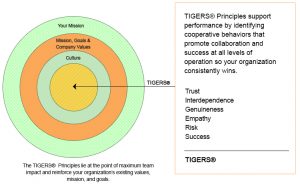 Your email dings. A new alert from social media pops up and then a coworker IMs you. This all happens within a few seconds of each other. You lose focus on your task.
Your email dings. A new alert from social media pops up and then a coworker IMs you. This all happens within a few seconds of each other. You lose focus on your task.
It seems to you that the quickest way to refocus is to respond to each of these notifications before digging into your other tasks for the day. In reality, all of these distractions shift your focus to non-critical work instead of your most important daily goal.
In today’s work world, too many people and platforms vie for your focus and attention. Some people spend too much time responding to shallow tasks rather than getting into the real, deep and meaningful work that their jobs require.
For example, important team meetings and emails, are necessary and they have their place in every work environment. Team members need to be on the same page and working toward common goals, and these types of tasks can keep team members accountable to one another and themselves. These activities, however, aren’t the most important aspects of anyone’s position and should be treated as such. This means that meetings that waste time that could have been solved with a simple phone conversation take precedence.
Leaders and team members must prioritize their time. To complete meaningful work, schedule time free from distractions to complete important tasks. This might include isolating yourself and turning off all alerts.
Other ways leaders can help focus their team members on meaningful work include the following two recommendations.
Focus on priorities.
In many cases, more is caught than taught. This means that employees follow what you do rather than what you say. If you expect employees to place value on deep work, then you as a leader must place value on deep work, too.
If the majority of your time is spent running meetings or checking and answering email, then your team members will place value on those tasks and follow your example of time management. To get everyone on board with shifting their focus to more meaningful tasks, leaders must model what this behavior looks like.
Therefore, establish clear expectations with your team members regarding what work is important and should require the most time. Then give them and yourself the time and space to complete these tasks. Schedule time on your own planner to complete important tasks, and discourage distractions during set time frames. For example, set up and automatic response email that explains that you will respond to emails after a set time, and then stick to it. Then give employees the same opportunity. Respect their time and space when they are engaged in deep work that requires solitude without distractions. Make it clear to every team member that this work is important and needs to be respected, and then follow through.
Assess your team members’ focus strengths.
Leaders can help facilitate deep and meaningful work by assigning tasks to team members based on their individual strengths. Employees who say that they use their strengths on a daily basis are 8 percent more productive and 15 percent less likely to quit. Anyone monitoring waste in the bottom line can show you how this adds up to cost savings or productivity improvements in your organizational bottom line.
For example, strength activated employees are better invested in their organizations and are more satisfied with their roles and positions. This leads to better quality work and higher retention. Both offer substantial savings in the financial bottom line and in customer satisfaction.
In order to create this type of environment, learning about team members on a one-on-one basis is critical. Then a strategy needs to be in place to identify team member strengths in diverse areas.
Assessments that help with focus.
 One resource is the TIGERS Workforce Behavioral Profile, which utilizes three surveys in one to assess workgroup behavior, identify areas of strategic workforce development focus and then track return on investment for team interventions delivered. The surveys measure the quality of work culture and department behavior based on six principles of trust, interdependence, genuineness, empathy, risk and success that are required for superior performance. When you understand how to best utilize your team members, your team will be better positioned and excited to perform deep and meaningful work.
One resource is the TIGERS Workforce Behavioral Profile, which utilizes three surveys in one to assess workgroup behavior, identify areas of strategic workforce development focus and then track return on investment for team interventions delivered. The surveys measure the quality of work culture and department behavior based on six principles of trust, interdependence, genuineness, empathy, risk and success that are required for superior performance. When you understand how to best utilize your team members, your team will be better positioned and excited to perform deep and meaningful work.
Focus summary.
With all of the distractions available in today’s world, it’s easy to spend all of your time engaging in insignificant work. Not to say that attending meetings and answering emails aren’t important, but they don’t require much in terms of critical thinking or ingenuity. The tasks that do require more thought and time are often placed lower on the list of importance, which is unfortunately backwards. These tasks are important and need to be regarded as such.
In order to accomplish meaningful work, leaders must first focus on their own priorities and model the behavior that they expect from their employees. Then it is important to assess their team members’ strengths to give them the opportunity to utilize their strengths on a daily basis. Through these strategies, leaders can help shift the work environment to one with focus on accomplishing deep and meaningful work over shallow and easy daily tasks.
Care to dig deeper into this focus conversation?
Consider the following resources to add to the conversation:
- How Managers Can Help Teams Perform Work That Matters
- Employee Strengths Build Strong Workplace Cultures
- TIGERS Sample Workforce Behavioral Profile
Copyright TIGERS Success Series, Inc. by Dianne Crampton
About TIGERS Success Series Group Norm Facilitator Training
 TIGERS Success Series provides a Manager Facilitator training with a tool box that engages employees to identify the group norms that improve both department and company work culture. It helps organizations to re-engage employees, resolve conflict behavior and builds work relationships. These same resources and tool box can be used to onboard new employees and contractors onto existing teams so behavior is understood and normalized from the get-go. The training and tool box are brought to you when eight or more of your managers are enrolled.
TIGERS Success Series provides a Manager Facilitator training with a tool box that engages employees to identify the group norms that improve both department and company work culture. It helps organizations to re-engage employees, resolve conflict behavior and builds work relationships. These same resources and tool box can be used to onboard new employees and contractors onto existing teams so behavior is understood and normalized from the get-go. The training and tool box are brought to you when eight or more of your managers are enrolled.
Call 1-877-538-2822 US or 1-541-385-7465 international to inquire.